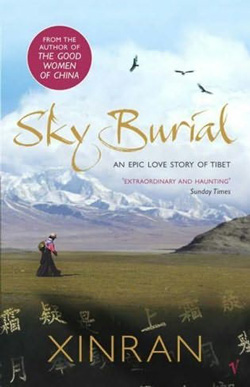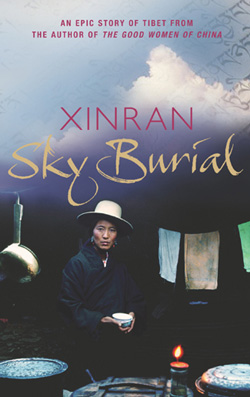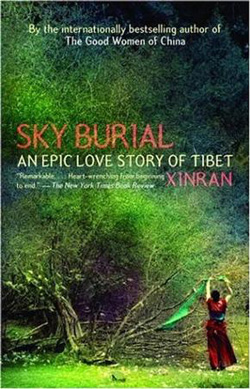

At Belletrista we love talking about books almost as much as we love reading them, and we know you do too. That's why we've decided to launch an exciting new feature, bringing together small groups of readers from different backgrounds and getting them to talk about a particular book. Here three of our regular contributors get us started and share with us their virtual discussion about Xinran's Sky Burial, but over the next few months Belletrista readers will have the chance to get involved too!
Participating:
British-born Rachel Hayes, 38, is a conference interpreter based in Brussels, Belgium.
Caitlin Fehir, 25, High School English teacher in Ontario, Canada
Joyce Nickel, 47, Corporate writer in Vancouver, British Colombia, Canada
As the host of a popular show on Chinese radio in the 1980's and 90's, journalist Xinran heard surprisingly candid tales from her female compatriots about their lives during and after the Cultural Revolution, and after leaving China for Britain she wrote The Good Women of China, a collection of some of the stories she had heard. Sky Burial, too, was born out of Xinran's time on the radio show; years before she left China she was put in touch with Shu Wen, who told Xinran her incredible story over the course of two days and then disappeared. It took Xinran until 2004 to compile enough information about Tibet to make the story make sense, and Sky Burial is Xinran's telling of Shu Wen's tale.
Sky Burial in a nutshell: Recently qualified doctor Shu Wen marries her sweetheart Kejun, only to see him sent to Tibet as an army medic within weeks of their marriage. Some months later she receives news of his death, which she refuses to accept. Instead she sets out for Tibet to find him, enlisting in the army herself, this being the only way to enter the country. Once in Tibet she leaves the army and is taken in by a family of nomads who agree to help her with her search …and thirty years go by.
Warning: towards the end of our conversation (clearly marked in the text) we discuss the book's ending—stop reading when you see our warning if you feel this would spoil the book for you.

Rachel: When I read The Good Women of China several years ago I was captivated by the extraordinary stories Xinran tells about ordinary Chinese women. I'd been wanting to read Sky Burial ever since so I was pleased we chose it for this conversation; it's yet another extraordinary tale of someone who started out on a conventional enough path, only to deviate from it spectacularly. Like Xinran, I'm fascinated by how someone could go from being a 26-year old doctor in China to being an elderly Tibetan Buddhist. The book's subtitle is "An Epic Love Story of Tibet" and I think this unusual phrasing is apt—it's a story about Shu Wen's love for her husband, but it's also the story of Tibet, a love-song for the country and the people. The romantic in me finds Shu Wen's love for the husband she barely knew awe-inspiring—how she must have loved him in order to put herself through what she did, to give up on her own life altogether!—whilst the pragmatist in me can't help but think that 30 years searching for someone is just a way of escaping from reality. It's the story about Tibet, though, that really caught my interest, particularly as it's Tibet as learned, if you like, by Shu Wen, an outsider—learned from what she sees around her, which she slowly comes to understand over the years, and from what her Tibetan friend Zhuoma explains to her - then passed on to Xinran, who in turn explains it to us, so far removed from it; I've learned more about Tibet from this little book than I've ever learned before, and the descriptions of the nomadic way of life and of the desolately beautiful Tibetan plateau have made me long to find out more.
However, one thing that bugged me as I was reading was wondering to what
extent the book is fiction. Xinran had a 2-day conversation with Shu Wen
and then was never able to track her down again (there's even a
letter at the end of the book from Xinran to Shu Wen, begging her to get in
touch); as I see it the bones of the story are definitely Shu Wen's, and
therefore non-fiction. But how much flesh did Xinran have to add to produce
her story? Of course I devour volumes of fiction without giving it a second
thought—but here it bothered me slightly. The story's so amazing, so
incredible, that I felt the need to know exactly what was true and what
was imagined by Xinran. Cait, Joyce, were you aware of this as you read?
Joyce: Because Belletrista is all about celebrating fiction by women, I was puzzled by our choice of this book.
In my public library, it was shelved in the Asian history section. But like you say, Xinran only had two days with Shu Wen
and the story is so detailed that of course the author would have had to fill in a lot of gaps. I look at this as definitely
a fictionalized account of Shu Wen's experience. Besides, there is the fictional side of any memoir—our brains do not
file memories in an encyclopedic, factual manner (something my husband reminds me of way too often). And on the flip side,
there is a lot of truth in fiction, which, for me, is one of the reasons I love reading so much. Cait, what was your take
on the fiction vs. fact aspects of Sky Burial?
 Cait: Honestly, I found that as I read Sky Burial, I forgot all about this struggle between fact and fiction.
At first I was consciously trying to decipher the truth from the embellishment, but then I just became so caught up in Shu
Wen's story that this disappeared. Going back over the early sections of the novel, I found the conversations between
characters to be the most troubling. Rarely do our memories accurately record words, so I assumed that most dialogue is
fictionalized. For me, the dialogue was also the least engaging of Xinran's writing—it felt stiff and unnatural
at times. The descriptive sections were much more powerful, and I think that it is here we find the truth in the story.
Cait: Honestly, I found that as I read Sky Burial, I forgot all about this struggle between fact and fiction.
At first I was consciously trying to decipher the truth from the embellishment, but then I just became so caught up in Shu
Wen's story that this disappeared. Going back over the early sections of the novel, I found the conversations between
characters to be the most troubling. Rarely do our memories accurately record words, so I assumed that most dialogue is
fictionalized. For me, the dialogue was also the least engaging of Xinran's writing—it felt stiff and unnatural
at times. The descriptive sections were much more powerful, and I think that it is here we find the truth in the story.
I was really interested in the depictions of love in Sky Burial. Shu Wen's love for Kejun, and Zhuoma's love for
Tiananmen, are never fully explored. Both couples know each other for such short periods of time, and the reader gets
very little sense of why these women fall in love with these men. Yet, this entire story hinges on Shu Wen's marriage.
Rachel, Joyce, did you connect to the relationships in this book, or did you find them unrealistic? Or, is Shu Wen's
relationship with Tibet the star of Sky Burial?
Rachel: I think it's exactly this non-exploration of the relationships which led to my sense of wonder at how Shu Wen managed to sustain her love for so long. For me, the human love stories definitely take a back seat to Shu Wen's relationship with Tibet; we see her love for the land and the people grow slowly, almost intangibly, over the years. Here too we see Shu Wen's incredible perseverance and tenacity—by all accounts it wasn't an easy society to assimilate herself into! I loved the details of how she was thwarted in her attempts to learn the language in order to live more comfortably as part of the family of nomads who took her in by the fact that the family members appeared not to need words to communicate.
One of the most surprising things for me about Sky Burial was the treatment of the passing of time. Tibet is
portrayed as a land in which time has a different meaning; Saierbao's family of nomads are ruled by the seasons, but
there's no sense of urgency in their huge treks across the plateaux, and Shu Wen, despite her desire to find Kejun,
slips into their rhythm. A year goes by, five, twenty, thirty, and by the end of the book we see to what extent both
Shu Wen and the family have been left behind by progress and history—the world has been turning without them,
which I found very moving. What most moved or surprised you about Sky Burial?
Cait: Time is certainly an interesting concept in Sky Burial, and I think the thing that surprised me the most was the vast amounts of waiting. Shu Wen set out to find her husband, and yet for various reasons she ends up spending years of her life merely existing in Tibet. She does not actually actively try to find Kejun until after thirty years have passed. I understand that her lack of money and the language barriers made traveling through Tibet difficult, but I found her life with Saierbao's family odd in that she certainly was not setting out on her planned journey. If I were in Shu Wen's place, I think the lack of information about my husband would have disheartened me, and I would have returned home.
That said, I quite enjoyed this part of the novel. The information about the Tibetan culture and the nomadic lifestyle
was fascinating; I certainly learned a lot from Shu Wen's story. In fact, I think that what I will take away from Sky
Burial is not Shu Wen's journey at all, but instead the experience of learning about Tibet and China, places about which
I knew very little. I find that with a lot of my reading, particularly books I find through Belletrista. What do you
think—was reading this novel (and others set in foreign settings) about the story, or the culture and place?
Joyce: Well you two have not left me with much to say! The love stories between the two women and their missing men really didn't do much for me. I'm not a fan of love stories unless they are unusually compelling, and these ones really were not. Where the unusual, compelling love story came in here was with Shu Wen's love for Tibet. I realized as I was reading how little I knew about Tibet, and how interesting I found the culture. That's definitely the strength of this book. I was not engaged with the story at all until she met up with the nomadic family. Then it really took off for me.
The other aspect of this book that I found fascinating was, as you mentioned, Rachel, the passage of time. She joined the family and then said something along the lines of "autumn turned to winter, winter to spring and the seasons went by." I didn't realize until she met the group of Chinese people that it had been thirty years. Thirty years! The entirely different sense of time makes the Tibetan culture seem even more exotic—it's more than a difference in housing, food and clothing. I also really enjoyed reading about her impressions of China upon her return near the end of the book, and all the changes that had taken place in her absence.
Can we talk about the ending yet? I'd like to hear what you think about what happened to her.
(Stop reading here if you don't want to know how Sky Burial ends).
 Cait: Sure, let's talk about the ending! Personally, I'm glad that Shu Wen did not find her husband. It would have
been far too unrealistic if he was still alive in Tibet—even Zhuoma finding Tiananmen after all those years was tough
to believe. The way Kejun died was quite disturbing, though. I think I'm with Shu Wen on the idea of a sky burial; it seems
awful to me, even taking into consideration the reasons and beliefs behind it.
Cait: Sure, let's talk about the ending! Personally, I'm glad that Shu Wen did not find her husband. It would have
been far too unrealistic if he was still alive in Tibet—even Zhuoma finding Tiananmen after all those years was tough
to believe. The way Kejun died was quite disturbing, though. I think I'm with Shu Wen on the idea of a sky burial; it seems
awful to me, even taking into consideration the reasons and beliefs behind it.
I went back and reread the beginning of Sky Burial and realized that Xinran literally spoke with Shu Wen immediately
after she returned to China, and so 1994 is our last trace of her. I like to believe that Shu Wen returned to Tibet. I
think after thirty years she identifies far more with Tibet than with China, and modern China would have been such a
shock after living with the nomad family for so long. So I hope she went back to Saierbao's family, which, really, after
thirty years is her family too. What are your thoughts, Joyce?
Joyce: Yes, I agree that if she found her husband it wouldn't have rung true, although I'm glad that she did find out his fate and was able to have closure. I thought it was interesting that she was unable to find her family back in China—I'm very curious to know what kind of record the government keeps. I've always had the impression that the Chinese government was completely in control of their citizens, but maybe with a population over one billion, they really can't keep track of everyone. I wonder if she ever found them. I suppose it's likely that her parents had died, but I like to think that she was able to find her sister.
Like you, Cait, I think the best conclusion for her would have been to return to Tibet and her new family there. I'm not
sure if the Chinese government would have allowed that, and I'm not sure that she would have even been able to find them,
but that's the ending I like best for her story. Having an ending that is so up in the air makes the book more interesting,
in my opinion. It's really left up to the reader to imagine what happened to Shu Wen.
Ed note: Would you like to participate in one of our future book conversations? If so, write us at conversations [at] belletrista.com. Please tell us your age, where you are from, and just a little bit about yourself and what you like to read. We'll place you on a list and invite you to participate if we have a suitable spot. (You'll receive the book to be discussed from us).
